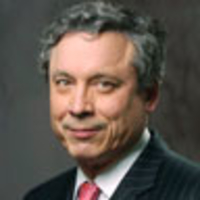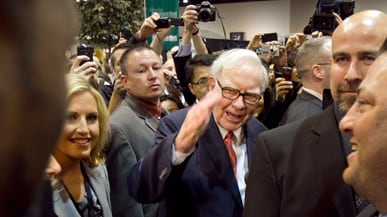Damage control does not get any better than this.
Warren Buffett exposed himself to questions at Berkshire Hathaway’s annual meeting in Omaha, Nebraska Saturday without getting dinged by the marshmallows tossed at him by three reporters and shareholders for nearly six hours.
The zinger that never came was: “What other insider trading do you suspect David Sokol might have done?” in his 11 years at Berkshire Hathaway before resigning.
Sokol, of course, is the 54-year-old executive anointed by Buffett as a brilliant possible successor who instead exited unceremoniously March 28, two weeks after Berkshire Hathaway bought Lubrizol Corp. for $9.1 billion.
While acting as Berkshire’s point man on the acquisition of the chemical manufacturer, Sokol placed his own $10 million side bet in early January, buying nearly 100,000 shares of Lubrizol stock. His purchase produced a $3 million profit, since he paid $31 a share less than Berkshire Hathaway did when it bought Lubrizol at $135 a share, a 28 percent premium on March 14.
Before taking questions, Buffett categorized Sokol’s actions as “inexcusable” and “inexplicable,” defusing the crowd of more than 20,000 shareholders at the Quest Center. The Oracle of Omaha added that Sokol, who simultaneously served as chairman of Berkshire subsidiaries: NetJets, MidAmerican Energy Holdings and Johns Manville, had “violated our insider-trading rules and he violated the principles I lay out every two years to our managers.”
Sokol insists he twice told Buffett he had Lubrizol stock, a claim about which Buffett said Saturday: “I made a big mistake by not saying: ‘Well, when did you buy it?’”
Buffett’s tone Saturday was a sharp shift from the initial three-page press release on March 30 when he gently announced Sokol’s resignation with the canard: “Neither Dave nor I feel his Lubrizol purchases were in any way unlawful. He has told me they were not a factor in his decision to resign.”
Perhaps the 18-page report released April 26 by Berkshire Hathaway’s audit committee reassured shareholders that the 80-year-old Buffett would stick to his famous vow that he would be “ruthless”—not toothless—while defending the company’s reputation.
The report said Sokol “violated” company disclosure policies, misled Buffett about his stock purchases and walked away from a potentially lucrative severance package by voluntarily resigning.
The report also said the company may sue Sokol civilly to recover his Lubrizol trading profits and will cooperate fully with government investigations, presumably initiated by the Securities and Exchange Commission. If the SEC suspects criminal conduct, Justice Department prosecutors and the FBI get involved.
As shareholders’ written questions were screened and relayed Saturday by three friendly reporters—Carol Loomis of Fortune, Becky Quick of CNBC, and Andrew Ross Sorkin of The New York Times, Buffett’s remarks were candid, but unchallenged and cleverly circumscribed. It certainly was more than most CEOs—even those paying more than simple lip service to corporate integrity—might attempt.
Still, the rules permitted the reporters to be free to select the toughest questions from those that were submitted; not ask their own, at least until rewarded their own offstage one-on-one chats. To be in the spotlight onstage parroting shareholder softballs with the business world’s No. 1 superstar apparently offsets the surrender of journalistic independence in pursuit of elusive access and the exclusive sitdown.
No one asked the Berkshire Hathaway chairman and CEO whether Sokol’s trades would have been discovered if a Citibank executive central to the deal had not mentioned his involvement to Buffett. No one questioned whether this matter would have come to light if Lubrizol had felt no need to disclose Sokol’s investments in its SEC filings.
The only indignation about Buffett’s remarks came shortly after the meeting wrapped up, in a statement from Sokol’s lawyer, Barry William Levine of the Dickstein Shapiro firm in Washington, D.C.
“It is alarming that Mr. Buffett would be advised to so completely flip-flop and resort to transparent scapegoatism,” said Levine. “At no time did Mr. Sokol violate the law or any Berkshire policy. At no time did Mr. Sokol intend to personally profit at the expense of Berkshire or its shareholders. At no time did Mr. Sokol mislead or deceive…”
There was no repeat mention of Levine’s assertion after the audit committee report that: “Mr. Sokol had been studying Lubrizol for personal investment since the summer of 2010; such investments are specifically allowed by his employment agreement.”
One wonders whether any of the shareholders thought to ask—and the reporters neglected to bring up—whether Sokol’s employment contract allowed him to trade stock for his personal accounts in companies that Berkshire Hathaway was considering for investment without informing Buffett, the board, its audit committee or its outside law firm of Munger, Tolles & Olson. Even the audit committee, which said it questioned Sokol three times before he declined further interrogation, did not report any inquiry beyond Lubrizol.

Levine, contacted through Dickstein Shapiro’s media representative, did not respond to this question from The Daily Beast: “Did Mr. Sokol ever buy stock in any other company before it was acquired by Berkshire Hathaway or in which Berkshire Hathaway made a substantial investment?”
Nor did anyone at the shareholder’s meeting ask either Buffet or Vice Chairman Charles Munger: “When did David Sokol begin confidentially scouting deals for Buffett?”
Certainly, it was no later than 2008 when Sokol was deeply involved in a Berkshire Hathaway bid for Constellation Energy. Berkshire Hathaway got outbid, but still made nearly $1 billion on the deal. Did Sokol double down on this transaction for his own account, knowing that Berkshire’s offer was going to be topped?
Since Sokol is an Omaha native and the staff at Berkshire headquarters is fewer than two dozen people, investigators may want to know whether he traded on inside information that Buffett was going to commit billions in 2008 investing in Goldman Sachs, Wrigley, General Electric and a Chinese car manufacturer. Maybe the SEC will even look at Sokol’s investment pattern in transportation stocks before Buffett’s biggest deal ever, the $44 billion in cash, stock and assumed debt takeover in 2009 of the Burlington Northern Santa Fe Railway company.
The case against Sokol will pivot around the company’s assertion that he had a “duty of candor” to disclose fully and immediately his personal investments made in potential investment targets. Buffett’s performance showed Saturday why he is an expert bridge player: He disclosed just enough information to win.
Allan Dodds Frank is a business investigative correspondent who specializes in white collar crime stories. He also is the former president of the Overseas Press Club of America, one of the many journalism organizations that protests the arrests of journalists abroad and repression of freedom of speech.





